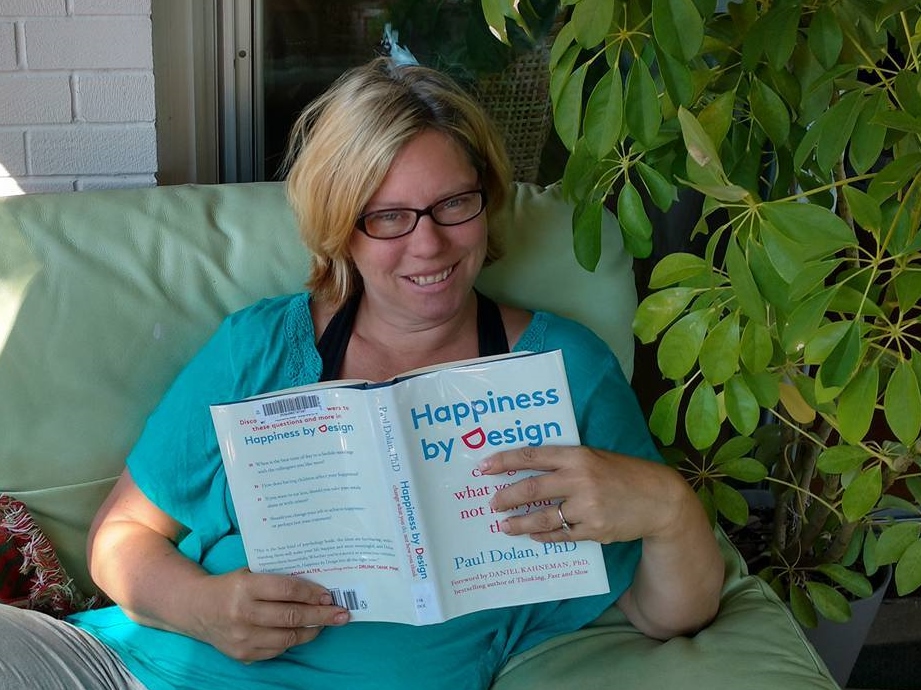Change what you do, not what you think
by Paul Dolan PhD
Book Review by Frances Adamson
I was attracted to this boo k because of the tag line- change what you do, not what you think. Nothing gets my goat more than when someone suggests we ‘stay in the present moment’. Why? Because in my experience that is not something we humans do easily, and instead of making us happy, we just feel bad that we can’t actually do it. So I love it when someone suggests taking action, rather than changing what we think.
k because of the tag line- change what you do, not what you think. Nothing gets my goat more than when someone suggests we ‘stay in the present moment’. Why? Because in my experience that is not something we humans do easily, and instead of making us happy, we just feel bad that we can’t actually do it. So I love it when someone suggests taking action, rather than changing what we think.
This read is interesting if you wonder how researchers have come to some conclusions about happiness, for instance, that volunteering will make you feel good. Dolan carefully explains just how easily one might misinterpret data, and even ask the wrong questions. He points out the differences between what people think will make them happy, and what actually appears to do so. The big takeaway though is that happiness is not just a product of pleasure, but also a purpose.
He recommends that we take into consideration purpose, and our contribution to others, perhaps society, and even our own lives in our choices. Shameless plug- like if we do yoga, and some days we would rather sleep in, or miss class, but we remember the purpose, improving our health, reducing stress, relieving chronic pain, or whatever the reason is, and know our happiness will increase, then we take action and follow through. Of course, many people, I included, get a lot of pleasure from doing yoga. It is finding a balance between purpose and pleasure that seems to optimize joy and contentment.
But he promises us that there are practical steps to take, and using the example above, these might be leaving your yoga mat where you can see it in the morning, building a routine and committing to small steps, like 10 minutes a day. Having a buddy you meet for a class or have a tea with before or after. An important point he makes is that most of us believe we don’t have time for these things. Dolan argues that we have much more discretionary time than we believe and that we may be more likely to act if we understand what really makes us happy and go for it.
Although Dolan never once mentions meditation or yoga, many of his conclusions are very similar to what I have been taught. Particularly the idea that what we pay attention to makes or breaks our experience of life, and how happy we consider ourselves to be. This explains why gratitude, hands down, seems to be something that joy experts agree is an excellent tool to feel happier. When we practice gratitude we focus on positive experiences and circumstances. Two people experiencing similar events will evaluate them differently depending on whether they focus on the negative aspect or the positive.
For example, I recently completed a government-funded business course. Out of 60 participants, 25 were chosen to go forward to an event in which they pitched their business, and only 10 won a grant of $5000. We were coached throughout to focus on the value of the training and not the prize. We were encouraged, especially near the end, to be proud of our efforts; to remember why we participated, which was to develop our business idea and to be confident that we had formulated a business plan that was viable. Those of us who were able to do so felt pretty good about ourselves and optimistic. Anyone who became preoccupied with the money was pretty disappointed if they didn’t win it.
Throughout this book, there is a very relevant thread, that unlike money, happiness is not something you can put away for a rainy day. The time we spend unhappy is never recoverable. Paul Dolan shows us a few common, mistaken beliefs about what actually makes us happy, and some ways in which we evaluate our life satisfaction, that may be incorrect. He backs this up with not just the data, but a clear discussion and analysis of the difficulties in quantifying Joy and his methods used.
Take away: it is worth spending some time to consider how the experience of our daily lives contributes to our overall happiness. Then we can take some steps to build happy experiences into our lives, and get on with it.
Frances Adamson teaches yoga in Oshawa- 279 Central Park Blvd. North
Phone: 289-928-7292

Love this!! I’m on board with this line of thinking. I will put this on my reading list!